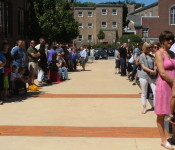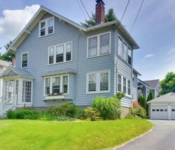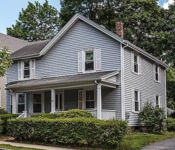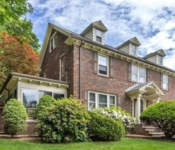Limitations to Belmont’s financial future and job security trumped demands for big pay increases as the Belmont School Committee and Andy Rojas, chair of the Belmont Board of Selectmen, approved three-year labor agreements with the four bargaining units represented by the Belmont Education Association on Tuesday, June 24.
“There’s been a relationship of honest communication and trust established that we can build upon,” BEA President John Sullivan told the Belmontonian after the committee’s regularly scheduled meeting held at the Chenery Middle School.
“We hope that the process producing these agreements has helped deepen relationships based on trust and mutual understanding that will support teaching and learning through the life of these contracts,” said a press release dated Wednesday, June 25 that was signed by Belmont School Committee chair Laurie Slap and Sullivan.
After a year-long negotiation, the union and the committee reached the tentative agreements on Thursday, June 12 with the BEA units approving the four respective agreements on Wednesday, June 18.
The four units comprise teachers (Unit A), directors and assistant principals (Unit B), clerical employees (Unit C) and paraprofessionals (Unit D).
On the salary front for teachers – that makes up the largest BEA unit with approximately 300 members – most of the increases over the next three years will be going to the most senior of the teachers. Those with 14 or more years of service, known as “top spots,” will receive the bulk of increase:
- Year one, only the “top” educators will receive a 1 percent increase,
- Year two a 2 percent increase for the top educators while those with 13 years or less will receive a 1 percent increase, and
- Year three, top step educators will get a 2.5 percent with the less-senior educators receiving 1 percent again.
Yet those increases have been tampered down by the effective dates of the jump in salaries; increases in the first year will not begin showing up in pay packages until the 113th day of the year, with similar delays in the subsequent years; 109 days in year two and 121 days in year three.
“So the one percent increase in the first year is really about 80 cents to the dollar,” said Sullivan, a teacher at Belmont High School who led the union’s 10-member negotiating team.
“We believe the compensation picture has stayed within the projected available revenue that will be coming to the school department over the next three fiscal years,” said Belmont District Superintendent Dr. Thomas Kingston who participated in his final committee meeting before department from his three year “interim” position on June 30.
While the contract’s pay compensation increase is sparse for most teachers – two percent over two years – the membership approved the union’s package overwhelmingly, said Sullivan.
“We had a lot of questions on salaries in our meeting last week,” said Sullivan, having met with his membership for an hour before the votes was taken last week.
Modest increase in salary
“There was faith in the team and trusted the work that we had done with the school committee. … [the] compensation package allows Belmont to say competitive in retain and attract highly-qualified teachers,” said Sullivan.
In a recent Boston Business Journal report, Belmont teachers ranked 30th in state according to salary information from 2011 with an average teacher’s salary of just lower than $80,000.
“We remain on that upper level of compensation with other towns so we are competitive,” said Sullivan.
The relatively modest pay increases for Belmont teachers in this contract is based on the acceptance by both sides that the town is unlikely to see any appreciable increase in available revenue for the foreseeable future.
The realization Belmont relies heavily on residential property taxes – whose increases are limited to 2 1/2 percent annually – while lacking the capacity to generate tax revenue from new growth such as commercial real estate or fees restricted what the union could ask for and the town to give.
“The agreements provide for compensation in line with projected annual School Department revenues for fiscal years 2015, 2016, and 2017,” said the School Committee press release.
Both the committee and Sullivan said the most important issue facing the sides was that the district “remains committed to attract and retain a highly qualified staff that meets the needs of our students,” according the committee’s press release.
The other major agreement achieved in the contract is job protection for paraprofessional such as teacher’s aides. The new contract states that at the end of the 2015-16 school year, no [paraprofessional] who has successfully completed five years of service can only be dismissed with “good cause.” In addition, a new evaluation system will be jointly negotiated during the upcoming school year.
“We have a highly-dedicated group of professional aides that does a great job supporting students. It’s a sign of respect and [they] feel better with their position within the district,” said Sullivan.
In addition to the job protections for the aides, the agreements also provides the standardization of clerical personnel job classifications and pay-for-performance benefits to directors and assistant principals, said the press release.
The agreement continues the “step and lane” salary schedule in which teachers receive pay for years of service and education level they achieve.
Kingston said while he continues to believe “step and lane” compensation is “unsustainable,” he said this contracts mitigates the formula by acknowledging the limits on revenue growth.
Both sides agreed that employing in part the principles of interest-based bargaining – in which both sides expressed their underlying interests for each request – greatly assisted the negotiation process.
The committee and the town will also be created a Joint Labor-Management Committee to “continue addressing district-wide issues of mutual concern,” said the press release.
“It’s building on the relationships we’ve established so we won’t have as many items in three years with the next contract,” said Sullivan.
“We don’t want to put everything on hold for three years,” said Slap.
The specific details of the agreements are available on the Belmont School Department’s website under the School Committee tab in the next few days.
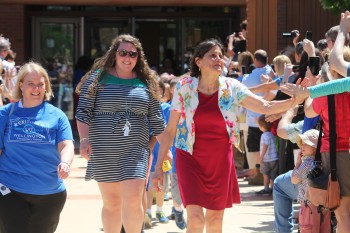 It was a bit past 11 a.m. on Friday, June 20, the last day of school for students at the Roger Wellington Elementary School, and the crowd of parents packed the edge of the school’s front walkway.
It was a bit past 11 a.m. on Friday, June 20, the last day of school for students at the Roger Wellington Elementary School, and the crowd of parents packed the edge of the school’s front walkway.